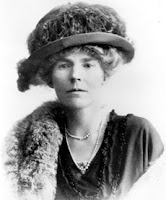Today was a large rally in Tahrir Square, aimed at reversing the so-called "supra-constitutional principles" and protesting SCAF; a week from Monday, Egypt will start its long-awaited elections (more on both to follow); but both events are having to share the headlines with another controversy of national import: a 20-year-old female art student who, to protest the role of women, posted a nude picture of herself on the Internet.
Artists often seek to play a transgressive role, and 20-year-olds tend to be rebellious and sometimes exhibitionistic, and such things tend to be shrugged off in the West as youthful protest that may interfere with future employment prospects, but in Egyptian society today, this really is art as politics, and politics of the most bomb-throwing sort.
As this article notes, it has of course provoked the particular outrage of the Islamists, and talk of prosecution under the blasphemy laws (I gather since she has also proclaimed her atheism). But it is also making the secular liberals uncomfortable, because it goes beyond what they consider proper, and since they fear the Islamists will use this to tar secularism as a movement supporting nudity, promiscuity, and such. Though the blogpost in question carries an October date, awareness of it has spread only this week.
Among a great many commentators weighing in on the subject,
Issandr El Amrani sees it as a useful jolt and a new form of social protest, with reservations:
Seeing things like this is a little bit of a shell-shock, because people are obsessed with the political process and Egypt's flawed transition all this stuff almost seems silly and juvenile in comparison. I love it all the more for it, although I also worry about Alia's safety and society's response. Egypt, to be blunt about it, is a deeply bigoted and narrow-minded place. Some people may even be angry with her for associating secular/liberal values with what many will simply see as debauchery.
I don't want to get into a discussion about cultural sensitivity and all that, but simply note and applaud the sheer brazenness of acts like this: they are so radical in this society they appear as if they are from another dimension. Societies need that kind of jolt every now and then, and it reminds me how the youth bulge in the demographics of Egypt and many Arab countries will inevitably shatter taboos, as the Baby Boomers did in Europe and the US. We should just remember that protestors of May 68 in Paris, as influential as they were, were dwarfed by the demonstrations of support for De Gaulle, and that the generation that gave us hippies in America gave us many more born-again Christians.
Joseph Mayton
wrote a similarly positive response at the Bikya Misr website, and notes that he is catching flak for it, from liberals as well as conservatives. Other bloggers have offered commentary as well. Mona ElTahawy's column in
The Guardian summarizes one approach:
"Egypt's naked blogger is a bomb aimed at the patriarchs in our minds." A google search will find a lot more of this kind of \commentary.
Now, while I agree on the one hand that it is hard to imagine a protest that would provoke more debate about the role of women in Egyptian society, I also recognize that this particular protest, which would go largely unnoticed in Europe, so transgresses the norms of society by injecting a discussion of female sexuality into the political realm as to outrage even many liberals, or as Mayton notes, liberal males. While protesting the oppression of women, by combining her nude picture with her proclaimed atheism she is being as in-your-face as she can possibly be in a society like Egypt's today, where, as she herself has noted, artists are no longer permitted to use naked models.
An art student at the American Univrsity in Cairo who turned 20 just days ago, Aliaa Elmahdy is apparently the girlfriend of
blogger/activist Kareem Amer, whom some are blaming, though she has claimed the pictures were taken before she met him.
Aliaa Elmahdy enjoys her 15 minutes of fame for the moment.
She is also getting coverage in the Western media and
in the Middle Eastern media outside Egypt. I've deliberately chosen to link primarily to the social commentary up to now, but she has the usual presence on
Facebook and on
Twitter. both her own account and as a subject for discussion at the hashtag
#NudePhotoRevolutionary. Most of these posts are in Arabic, as are the captions to that notorious
web posting itself, which I'll link to not for sensationalism but because it would take only a click or two to find anyway, but with all the usual warnings: contains nudity, not safe for work, etc. etc. (The post includes other nude images besides the blogger herself, but the fact that an Egyptian woman appears is what set off the firestorm.) Despite all the outrage, there are reports that the site has also received some 1.5 million visitors this week.
Naturally, I wonder if, in five or ten years time, this rebellious act at 20 will seem so well-advised; unfortunately given the current context in Egypt, there is reason to fear not just for her future employment prospects, but for her physical survival. It's easy to say that on the eve of elections Egypt should have more serious things to talk about, but as many of the commentators have noted, the role of women is one of the central issues dividing Egyptians today. And just as the intellectual discussion seminar was getting underway, Aliaa Elmahdy has thrown a bomb into the seminar room.
Update: Now a group has declared January 1 "National Gay Day in Egypt." I'm sure the revolutionary motivations are real, but the Islamists must be overjoyed.





















